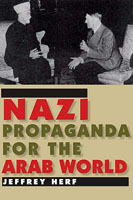Maryland History Professor Researches Nazi-Arab Collaboration During World War Ii
December 01, 2009

For Immediate Release December 1, 2009 Contacts: David Ottalini, 301 405 4076 or dottalin@umd.edu By: Lauren Brown, UM NewsdeskCOLLEGE PARK, Md. - After four decades of studying Nazi Germany and the Holocaust, Maryland history Professor Jeffrey...
For Immediate ReleaseDecember 1, 2009
Contacts: David Ottalini, 301 405 4076 or dottalin@umd.edu
By: Lauren Brown, UM Newsdesk
COLLEGE PARK, Md. - After four decades of studying Nazi Germany and the Holocaust, Maryland history Professor Jeffrey Herf made one of the most important archival discoveries of his career just a mile from his office.
More than 3,000 pages of transcripts of Nazi radio broadcasts to Arab nations in the Middle East, stored at the National Archives in College Park, had apparently gone without notice since being declassified in 1977. They reveal the extent to which German officials not only presented their country as an ally of Arab anti-imperialism but also exploited the Koran to spread anti-Semitism.
Herf's exploration of this treasure trove became the foundation for his fifth book, "Nazi Propaganda for the Arab World," published last month by Yale University Press. A book launch, where Herf will give a talk and sign copies, will be held at 4 p.m. Dec. 1 at the Woodrow Wilson International Center for Scholars in Washington, D.C.
"We hear all the time about diversity and multiculturalism; sometimes they get together and produce wonderful things, like British rock music in the 1960s, and the world is richer for it," says Herf, who has taught at Maryland since 2000. "But sometimes when cultures get together, they bring out the worst in each other, and that's what happened in wartime Berlin."
He knew that the Nazis wanted to extend their "Final Solution" -- the extermination of European Jews -- to the Middle East. But he wondered if he could write a book on the subject without knowing Arabic. Cairo was the multicultural center of the Arab world during and after World War II. Herf wondered what the American Embassy in Cairo was reporting about events during the war. Exploring embassy files in the archives, he learned that American officials there were carefully monitoring Italian and German short-wave radio broadcasts, and in June 2007 Herf found the verbatim, English-language transcripts called the "Axis Broadcasts in Arabic."
While both regimes regularly distributed pamphlets onto the Middle East during the war, they weren't as effective as short-wave radio, Herf says, partly because 80 percent of the region's population was illiterate.
The expertise of prominent Arab exiles in Berlin aided the Nazis in crafting an ideology and rhetoric that would appeal to Arab audiences. They helped alter the message and wording of the broadcasts to suggest in familiar, cultural terms that the Nazis shared Islamic values, such as obedience, community and piety, and that the regime supported Arab independence from "British imperialism," "Bolshevik barbarity" and "Jewish greed."
The broadcasts also show how the Nazis selectively used passages from the Koran to spread hatred of the Jews and of Zionism. Herf asserts that the wartime propaganda offensive was an important chapter in the longer and broader history of Islamic extremism.
A July 1942 broadcast on the Voice of Free Arabism station, "Kill the Jews Before They Kill You," opened with the false statement that Britain had armed Jews in Egypt to rise up against Egyptians when the Nazis drove British forces from the country: "In the face of this barbaric procedure by the British, we think it best, if the life of the Egyptian nation is to be saved, that the Egyptians rise as one man to kill the Jews before they have a chance of betraying the Egyptian people." American University history Professor Richard Breitman, author of "Official Secrets: What the Nazis Planned, What the British and Americans Knew," says Herf's book "contributes greatly to our understanding of anti-Semitism in the Middle East."
"Jeffrey showed effectively that there was a kind of fusion of ideology and ideas and attitudes that took place during World War II," says Breitman, who will speak at the book launch. He and Herf agree that much more research needs to be done, some of it at the National Archives in College Park, which Herf called "terribly underutilized."
"The fact that these files were there for 30 years and were not entered into the scholarship is so sobering," says Herf.
Read the original article here

